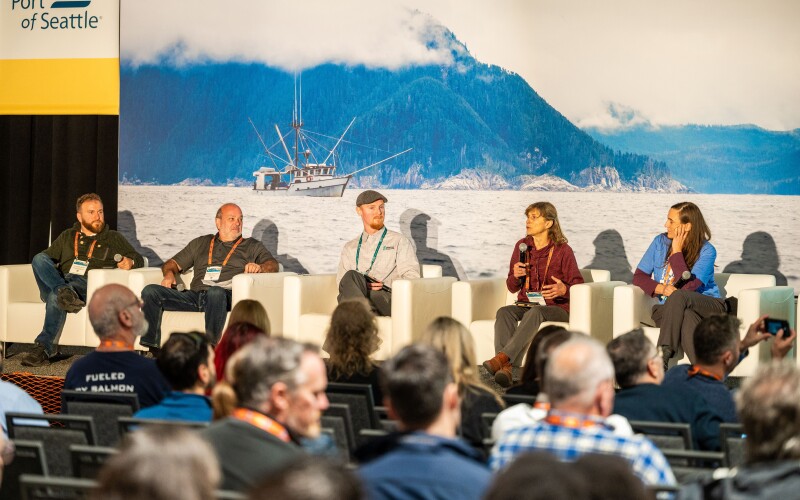The Sitka fishing fleet is pioneering energy-efficient commercial fishing. In 2021, the Alaska Longline Fishermen’s Association (ALFA) was selected by the DOE’s National Renewable Energy Laboratory (NREL) to partner in exploring ways fishing vessels can be powered by low- or zero-emissions propulsion systems. Two years later, the Vehicle Technology Office (VTO) funded ALFA to oversee three projects that will pilot different low-emission technologies.
The first is a hybrid battery-diesel system that allows a fishing boat to use diesel when traveling quickly to fishing grounds and then switch to a battery-electric motor when fishing. This system can reduce fuel consumption by up to 80% without requiring significant changes in fishing practices on one-to-two-day trips. It will be funded with grant support from AgWest Farm Credit and Acme Seafoods, with coordination and data support from Kempy Energetics. The hybrid system is designed to optimize the use of the engine and motor and will be equipped with data loggers to measure the fuel efficiency achieved at sea.
The second pilot project will test a different type of propulsion system that will be determined based on interest from the fleet. One candidate is a series hybrid system that allows fishing boats to reduce fuel use when running short or long distances. At all speeds, an electric motor powers the propeller, and a battery powers the motor. The battery can be charged at a Sitka dock with our green hydropower, or if a skipper needs to travel hundreds of miles, a diesel generator on-board can recharge the boat’s batteries. ALFA is inviting boat owners to apply for this retrofit. You can find the pre-application at https://www.alfafish.org/vto-project.
The third model to be tested by ALFA is a fully battery-electric system for mariculture vessels that stay close to shore harvesting shellfish, kelp, or seaweed. ALFA is contracting with Precision Boatworks in Sitka to assist with all three retrofits.
The objectives of testing all three model propulsion systems are to lower fuel costs, which can account for over 30% of a fishermen’s expenses, build local expertise, decrease emissions, and evaluate the systems for different fisheries and fishing operational models.
In undertaking this work, ALFA seeks to de-risk these emerging technologies and remove barriers to the decarbonization of this important Alaska industry. We are working with the Fishing Communities Coalition and the Fishermen Friendly Climate Action Campaign to advance climate solutions that increase fishing community resilience while decreasing our industry’s contribution to global warming and ocean acidification. ALFA will share lessons learned from these projects through our website and the National coalitions in which we participate.
A next step is to develop boat battery-charging infrastructure at our docks and seafood processing companies while we continue to explore next generation carbon-free fuels. This work is aligned with ALFA’s work to support modern and climate-resilient working waterfronts in Alaska with our local and regional partners, and nationally through the Fishing Communities Coalition.
Climate impacts on our fisheries are profound; commercial fishermen are uniquely positioned to craft both practical and political solutions. It’s time to pull on our boots and get to work.






